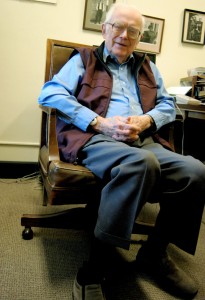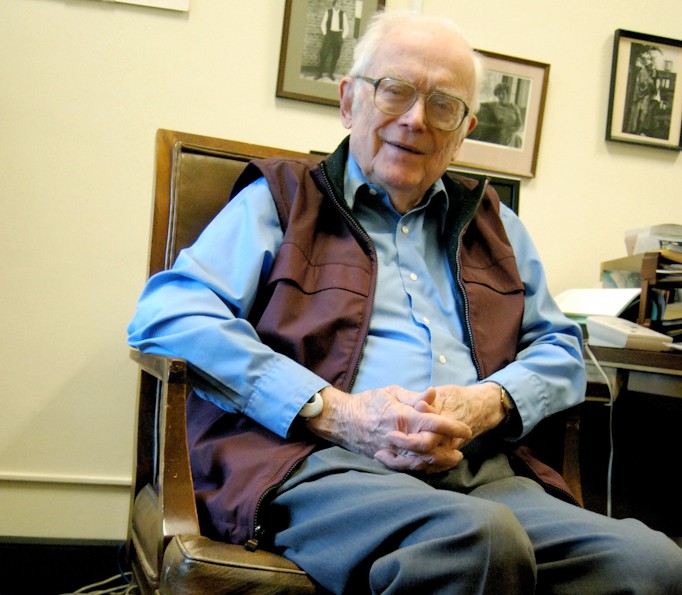
Former University President Richard Lyman died of congestive heart failure Sunday in Palo Alto. He served as the University’s seventh president from September 1970 until August 1980.
Lyman was 88.
At the end of Lyman’s 10-year presidency, The Daily’s Editorial Board took stock of his legacy in an editorial titled “Sorry to see Lyman go.”
“The University is now an undisputed member of the select club of academically superb institutions … What makes this achievement even more significant is that Lyman cemented the university’s position as a world-class institution during a period of unrest — both financial and emotional,” the editorial read.
Path to the Presidency
Lyman attended Swarthmore College before earning his master’s and Ph.D. from Harvard University. He also attended the London School of Economics on a Fulbright scholarship and taught history at Washington University in St. Louis before coming to Stanford as a history professor in 1958.
Before serving as University president, Lyman also served as the associate dean of the School of Humanities and Sciences and provost. In 1988, he founded and served as director of the center that later became the Freeman Spogli Institute for International Studies.
The choice of Lyman to replace Kenneth Pitzer as University president was one point of consensus amid the otherwise turbulent times on campus in the late ‘60s and early ‘70s.
The Daily wrote shortly after Lyman took office that it was rare for alumni, faculty members, students and trustees to “agree on anything, yet all these natural enemies managed to agree” on Lyman.
Weathering the storm
Lyman, however, did not receive a warm welcome to the University. During his first convocation address in September 1970, demonstrators employed the “give ‘em the axe” cheer normally reserved for sporting events against Cal.
Lyman’s term as president represented a time of significant transition for the University. He reflected in his memoir, “Stanford in Turmoil,” that Stanford rose from its status as a regional institution in the 1950s to a “nationally and internationally prestigious university by the time the ’70s were over.”
However, this rise to prominence did not come without upheaval on campus.
In his first year as president, Lyman suspended Associate English Professor H. Bruce Franklin for inciting violence among students on campus. Lyman was criticized for this action during a Faculty Senate meeting, in which Nobel Laureate Linus Pauling accused Lyman of infringing upon Franklin’s academic freedom and individual rights.
In early 1971, students accused Lyman of “tossing crumbs to black students” after a meeting with Black Student Union (BSU) leaders to discuss demands of the group. The co-chairman of BSU called Lyman “blatantly negative and hostile.”
BSU members had previously taken over the stage during a speech Lyman delivered in Memorial Auditorium in 1968.
“We believe that the lack of response is indicative of either a shallow interest in the questions which affect racial groups on this campus, or perhaps more accurately a genuine inability to deal with the questions of racism,” ASSU leaders wrote in an May 14, 1971, op-ed printed in The Daily.
Other on-campus protests during Lyman’s politically active tenure included protests against CIA recruiting, ROTC training on campus and conducting military research in campus labs. Students and faculty participated in sit-ins and protests that, in the case of the Encina Hall protest during Lyman’s time as University provost, shut down University buildings. He declared as president in 1971 that occupying a building was “not an acceptable form of political action within the University.”
Lyman urged students and faculty to stay away from meetings and marches in a Feb. 11, 1970, radio address on KZSU — one of the many weekly addresses he gave on KZSU. He characterized the disruptions as “the frankly declared attempt to reproduce as much of the war as possible on the Stanford University campus.”
These disruptions made their way to Lyman’s personal residence on El Escarpado Way. The University installed a tripwire alarm system, a hot line to campus security, a fire alarm wired directly to the campus fire station and additional exterior lighting around the house to protect it from protestors while Lyman was still provost.
During one incident that took place the evening Lyman was hosting a reception for the dean of the School of Humanities and Sciences, protestors threw rocks into Lyman’s upstairs windows and launched a soda bottle filled with red paint into the kitchen.
Lyman’s time as president also saw student uproar over more campus-central issues.
In 1972, Lyman’s recommendation that Stanford replace its “Indian” mascot was so unpopular that alumni withheld donations in protest, despite the student senate’s support for the mascot change at the time.
That particular point of discontent was not enough to keep Lyman from raising $300 million in the 1972 Campaign for Stanford. At the time, it was the largest-ever fundraising effort by an institute of higher education.
Away from Stanford
Lyman was unanimously elected to serve as president of the Rockefeller Foundation upon leaving Stanford in 1980, 10 years after he was named to the post, living out his own declaration in 1970 that a university president ought to only serve 10 years.
“Ideally a university president should serve long enough to accomplish something, and not long enough to make people think of his accomplishments wholly in the past tense,” Lyman told The Daily in October 1970, less than a month after he assumed the presidency.
Lyman also served on the National Council on the Humanities from 1976 to 1982 and as vice chairman of the council for two of those years.
The Stanford Alumni Association established the Richard W. Lyman Award for Faculty Service in 1983. The award gives faculty $1,500 earmarked for books and materials in the faculty member’s field of interest to given to Stanford libraries.
In 2002, the National Humanities Center inaugurated the Richard W. Lyman Award. The award, given to five people each year from 2002 until 2006, included a $500,000 grant from the Rockefeller Foundation and $25,000 prize in recognition of academics who developed a synthesis between knowledge in the humanities and technological innovation.
Lyman is survived by his wife, Jing (Palo Alto), daughters Jennifer (Washington, D.C.) and the Rev. Holly Antolini (Cambridge, Mass.), sons Christopher (Searsmont, Maine) and Timothy (Hartford, Conn.) and four grandchildren.
The family has requested that, in the place of flowers, memorial donations be made out to the American Friends Service Committee or the Michelle R. Clayman Institute for Gender Research at Stanford.
Kurt Chirbas and Josee Smith contributed to this report.
